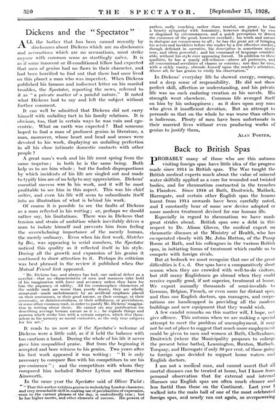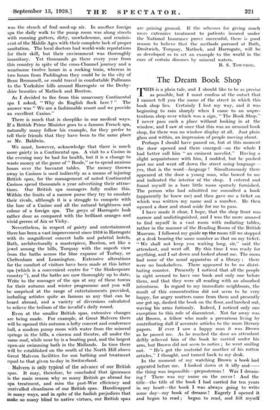Back to British Spas p ROBABLY many of those who are
this autumn visiting foreign spas have little idea of the progress made since 1914 in British spas. The War taught the British medical experts much about the value of mineral water skilfully applied as a cure for wounded and twisted bodies, and for rheumatism contracted in the trenches in Flanders. Since 1918 at Bath, Droitwich, Matlock, Harrogate, and certain other English spas the lessons learnt from 1914 onwards have been carefully noted, and I constantly hear of some new device adopted or more modern treatment devised for our human ills.
Especially in regard to rheumatism we have -made great strides ahead. British spas owe a debt in this respect to Dr. Alison Glover, the medical expert on rheumatic diseases at the Ministry of Health, who has co-operated closely with Mr. John Hatton, of the Pump Room at Bath, and his colleagues in the various British spas, in initiating forms of treatment which enable us to compete with foreign rivals.
But at bedrock we must recognize that one of the great difficulties is £ s. d. Our spas have a comparatively short season when they are crowded' with well-to-do visitors, but still many Englishmen go abroad when they could receive equally good, if not superior, treatment at home. We export annually thousands of semi-invalids to German, Belgian, French, or even more far distant spas, and thus our English doctors, spa managers, and corpo- rations are handicapped in providing all the modern buildings and new equipment that they would wish.
A few candid remarks on this matter will, I hope, net give offence. This autumn when we are making a special attempt to meet the problem of unemployment, it may not be out of place to suggest that much more employMent could be given to men and women at Bath, Cheltenham, Droitwich (where the Municipality proposes to enlarge the present brine baths), Leamington, Buxton, Matlock, Torquay, and Harrogate if only 50 per cent. of those going to foreign spas decided to support home waters and English doctors.
I am not a medical man, and cannot assert that all mortal diseases can be treated at home, but I know from personal observation that for external and internal illnesses our English spas - are often much cleaner and less foetid than those on the Continent. Last year I walked into the main hall of-one of the most celebrated -foreign spas, and nearly ran out again, so overpowering was the stench of foul .used-up air. In another foreign spa the daily walk to the pump room was along, streets with running gutters, dirty, unwholesome, and reminis- cent of the Middle Ages with their complete lack of proper sanitation. The local doctors had world-wide reputations for their skill, but their environment was thoroughly insanitary. Yet thousands go there every year from this country in spite of the cross-Channel journey and a wearisome twelve houri in a rocking train, whereas in two hours from Paddington they could be in the city of Beau Rrummell, or could travel in comfortable Pullmans to the Yorkshire hills around Harrogate or the Derby- shire beauties of Matlock and Buxton.
As I decided to flee from this unsavoury Continental spa I asked, " Why do English flock here ? ".. The answer was " We area fashionable resort and we provide an excellent Casino."
There is much that is sheeplike in our medical ways. If a British Prime Minister goes to a famous French spa, naturally many follow his example, for they prefer to tell their friends that they have been to the same place as Mr. Baldwin.
We must, however, acknowledge that there is much more gaiety in a Continental spa. A visit to a Casino in the evening may be bad for health, but it is a change to waste money at the game of " Boule," or to spend anxious hours over the baccarat tables. The money thrown away in Casinos is used indirectly as a means of injuring British spas,. for the management of noted Continental Casinos spend thousands a year advertising their attrac- tions. Our British spa managers fully realize this. Within the limits of a narrow purse they try to emulate their rivals, although it is a struggle to compete with the lure of a Casino and all the natural brightness and colour of a foreign spa. The greys of Harrogate look rather dour as compared with the brilliant oranges and vivid greens of Aix or Vichy.
Nevertheless, in respect of gaiety and entertainment there has been a vast improvement since 1918 in Harrogate with its magnificent concert halls and palatial hotels, Bath, architecturally a masterpiece, Buxton, set like a jewel among the hills, Torquay with the superb view from the baths across the blue expanse of Torbay, or Cheltenham and Leamington. Extensive alterations for the comfort of visitors have been made at this latter spa (which is a convenient centre for " the Shakespeare country "), and the baths are now thoroughly up to date. Write to the manager of the spa at any of these towns for their autumn and winter programme and you will be surprised at the range of entertainments provided, including artistes quite as famous as any that can be heard abroad, and a variety of diversions calculated to relieve the tedium of the invalid's daily round.
Even at the smaller British spas, extensive changes are being made. For example, at Great Malvern there will be opened this autumn a lofty concert and conference hall, a modern pump room with water from the mineral springs in the hills, a cinema and theatre, all under the same roof, while near by is a boating pool, and the largest open-air swimming bath in the Midlands. In time there Will be established on the south of the North Hill above Great Malvern facilities for sun bathing and treatment equal to that given to-day in Switzerland.
Malvern is only typical of the advance of our British spas. It may, therefore' be concluded -that ignorance is the main reason why so many British go abroad for spa treatment, and miss the post-War efficiency and unrivalled cleanliness of our British spas. Handicapped in many ways, and in spite of the foolish prejudices that make so many blind to native virtues, our British spas are • gaining ground. If the schemes for giving much more extensive treatment to patients insured under the National Insurance prove successful, there is good reason to believe that the methods pursued at Bath, Droitwich, Torquay, Matlock, and Harrogate, will be so developed as to set an example to the world in the cure of certain diseases by mineral waters.
B. S. TowNitoE,







































 Previous page
Previous page